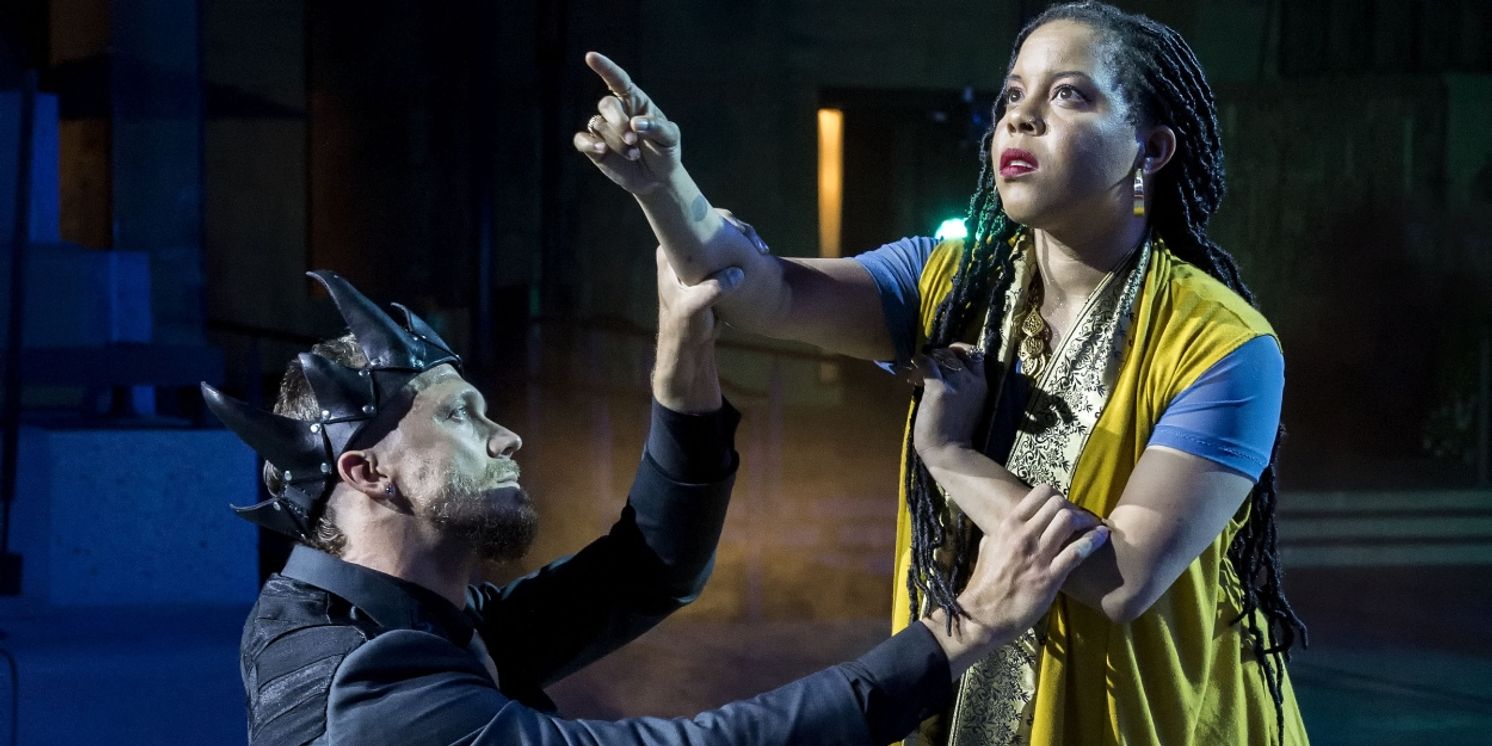Review: Worlds and Tragedy Collide In Bilingual OEDIPUS TYRANNUS at Getty Villa
Another triumph for Deaf West Theatre

Tackling everything from musicals to American classics, from contemporary drama to opera to new plays, Deaf West Theatre is a company that, in its illustrious 30-plus year history, refuses to ever be creatively static or subjected to pigeonholing. So of course, the producers of the annual classic at the Getty Villa's outdoor Barbara and Lawrence Fleischman Theater would approach Deaf West about taking on Sophocles's OEDIPUS TYRANNUS. With the right creative vision, Deaf West can pretty much take on anything and make us see it through an exciting new prism.
I would not, after seeing the misfire that was her production of HEAD OVER HEELS at The Pasadena Playhouse last year, have pegged director Jenny Koons as the person to shape that prism, but I would have been wrong. Directing her own adaptation of a translation by Ian Johnson, Koons not only thoroughly gets the play, her dazzling use of voice acting, American Sign Language and Pro-Tactile communication makes this performance an experience to savor. As with any Deaf West production, non-deaf viewers will need to adjust their focus to settle into the rhythm of tracking voice actors and supertitles, but the effort is well worth it. This endlessly-studied play about the fall of the House of Thebes doesn't often get a professional staging, making the opportunity at the Getty all the more exciting.
Honestly, when one considers the Greek greatest hits playlist (with MEDEA, LYSISTRATA and THE ORESTEIA among the most-performed), it seems strange that OEDIPUS doesn't get a lot more mountings. Perhaps it's the sheer familiarity, and the accompanying inevitability of this tale. Even if you have neither read nor studied it, you probably recognize that (complex?) name of the title, Jocasta, Creon and Tiresias. So you probably know exactly what's going to happen plot-wise, with the only salient question being "how much blood are we in for?"
Koons' moody production at the Fleishman is trying to tap into a noirish whodunnit vibe in which the story's professed detective is the one person in the building (or in this case, the amphitheatre) who doesn't realize that he is himself is also the murderer. There are multiple instances where someone who has divine wisdom tells Oedipus to call off his bullish quest to find a king's killer and thereby rid Thebes of its pestilence. But Oed, bless his prophetic soul, insists "I have to know."
Koons opens the play by having her citizens of Thebes walking through the audience and performing rituals within the playing space. Three large video screens give us the doomed faces of central characters and other symbolic imagery (created by Yee Eun Nam). Despite being in the open air, the performers make all the proceedings feel slightly claustrophobic, as if the walls are closing in (which, of course, they are).
The city is suffering from a generalized plague, and it falls to the king to determine the source and get rid of it. Oedipus dispatches his brother-in-law Creon (Jon Wolfe Nelson) to the Oracle at Delphi to determine the cause. The answer: avenge the murder of King Laius, even though the murderer's identity has never been identified. King Oedipus (Russell Harvard), who married the king's widow, Jocasta (Alexandria Wailes), vows to solve the mystery and punish the perpetrator. A blind prophet Tiresias (Ashlea Hayes) is brought in to give some answers, and things go violently downhill from there.
As rendered by frequent Deaf West company member Harvard, the King is wiry and temperamental, yet every bit a man of the people. Sporting a tie and dressed styllishly in black, this is an Oedipus who never seems fully comfortable with the trappings of royalty, a man who would rather act himself than direct others to do his bidding. Harvard occasionally interrupts his signing with vocalized words or phrases to emphasize a point: "I will save the city!" Rarely offstage and aided by his advisor (Matthew Jaeger who voices his speeches), Harvard gives us a man brought low by fate and by his own stubbornness.
Communicating via pro-tactile communication, and wielding her walking stick as though she would cause damage, Hayes (who is blind and deaf) is a fierce Tiresias. The play doesn't have a lot of light moments, but Nelson's jaunty Creon mixes gregariousness and pathos. And although her time on stage is not extensive, Wailes (also the play's ASL adaptor with Andrew Morrill) is plenty affecting as the doomed Queen Jocasta. Her aching plea to her husband to stop moving forward echoes the advice of, well, just about everyone.
A final huzzah goes to Amelia Hensley, the palace servant who - once the answer to the mystery has come horrifically to light - recaps the awful consequences. Enacting the monologue in ASL with no supertitles or voice actors, Hensley's recounting is impassioned, painful and eloquent.
OEDIPUS is a tragedy of operatic proportions. In Deaf West's hands, the quiet speaks volumes.
OEDIPUS TYRANNUS plays through October 1 at the Getty Villa in Malibu.
Photo of Russell Harvard and Ashlea Hayes by Craig Schwartz
Reader Reviews
Videos

